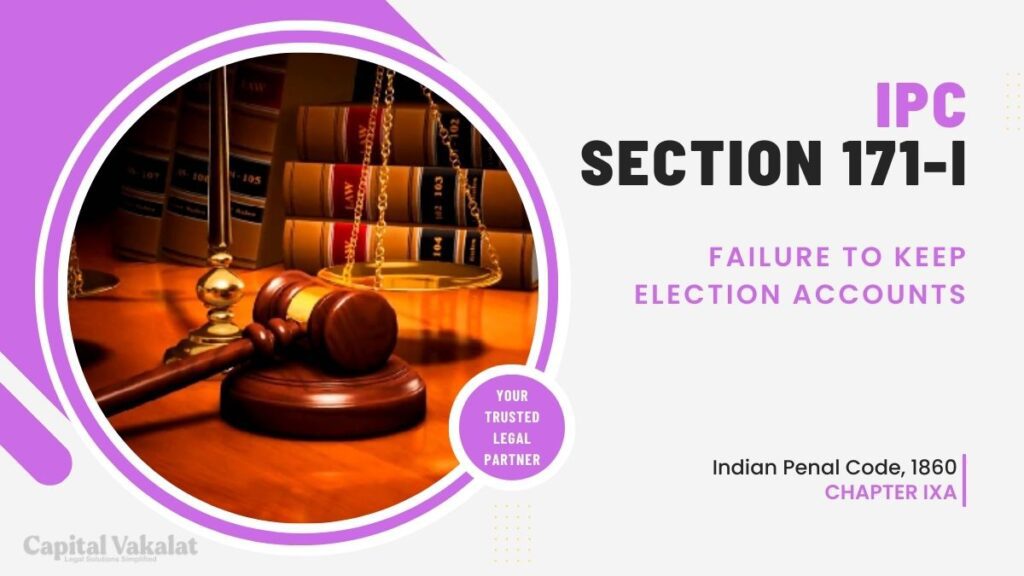In the democratic fabric of any nation, elections are pivotal events, and their transparency is essential for upholding the principles of a fair and accountable political system. One such legal provision aimed at ensuring transparency in election finances is Section 171I of the Indian Penal Code (IPC).

This article delves into the implications of failure to keep election accounts under Section 171I IPC.
Understanding Section 171I IPC
Section 171I IPC is a provision that mandates the maintenance of accurate and transparent election accounts by candidates contesting elections. It is a crucial component of India’s legal framework to combat corruption and promote clean elections.
Legal Framework for Election Accounts
Election accounts, as per Section 171I IPC, are required to be maintained by candidates within a stipulated timeframe. These accounts must include all expenses incurred during an election campaign. The objective is to ensure that political candidates are accountable for their financial transactions during the electoral process.
Failure to Maintain Election Accounts
Failure to keep accurate election accounts, as mandated by Section 171I IPC, is a serious offense. Candidates who do not comply with this provision can face legal consequences. This negligence can lead to electoral malpractice and the violation of the democratic spirit.
Consequences of Non-Compliance
Non-compliance with Section 171I IPC can result in severe penalties, including disqualification as a candidate in the election. Furthermore, it may lead to criminal charges, fines, and even imprisonment. This underscores the significance of adhering to election finance regulations.
Challenges in Implementing Section 171I IPC
The implementation of Section 171I IPC faces several challenges, including the difficulty in tracking campaign expenses, hidden sources of funding, and a lack of awareness among candidates about the legal provisions. These challenges can hinder the effective enforcement of this section.
Importance of Transparent Election Finances
Transparent election finances are vital for a functioning democracy. They ensure that candidates are accountable for their campaign spending and help in maintaining a level playing field. Without transparency, the electoral process can be tainted by corruption and favoritism.
Steps to Ensure Compliance
To adhere to Section 171I IPC, candidates should maintain meticulous records of their campaign expenses. This includes all financial transactions, contributions, and disbursements. Candidates must also submit these accounts to the authorities within the stipulated time frame.
Role of Political Parties
Political parties play a significant role in ensuring that their candidates comply with election finance regulations. They can provide guidance, resources, and training to candidates to maintain transparent accounts, reducing the likelihood of non-compliance.
Conclusion
In a democracy, the integrity of elections is paramount, and election finance regulations like Section 171I IPC aim to maintain this integrity. Failure to keep accurate election accounts not only carries legal consequences but also undermines the democratic values that a nation upholds. It is the responsibility of candidates, political parties, and the authorities to ensure compliance and transparency in election finances.
Frequently Asked Questions
What are the consequences of failing to keep election accounts under Section 171I IPC?
Candidates may face disqualification, legal charges, fines, and imprisonment for non-compliance.
How can candidates ensure compliance with Section 171I IPC?
Candidates should maintain detailed records of campaign expenses and submit them to the authorities within the stipulated time frame.
Why is transparent election finance important for democracy?
Transparent election finance ensures fairness, accountability, and the integrity of the electoral process, preventing corruption and favoritism.
What is the role of political parties in ensuring compliance with election finance regulations?
Political parties can provide guidance and resources to candidates, helping them maintain transparent election accounts and reduce the likelihood of non-compliance.